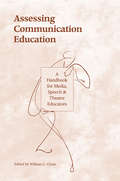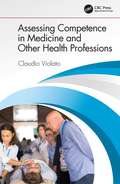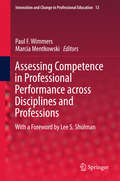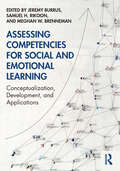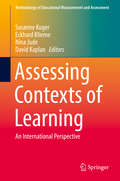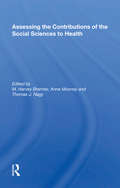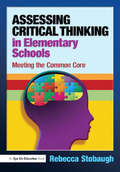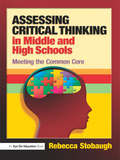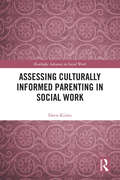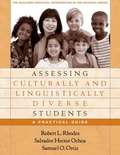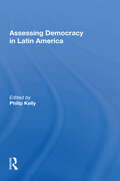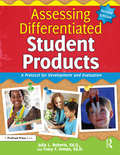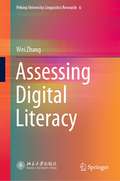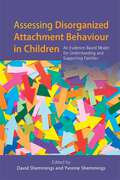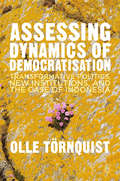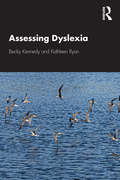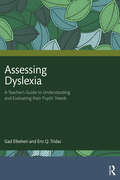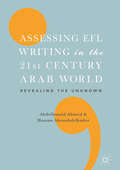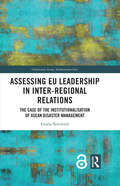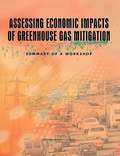- Table View
- List View
Assessing Common Mental Health and Addiction Issues With Free-Access Instruments
by Bradley T. Erford Katie M. Sandberg Taryn E. RichardsAs healthcare costs rise, so too do the costs of assessment instruments, critical tools for mental health professionals. While some traditional assessment instruments have become prohibitively expensive, as with many other fields, the Internet offers a host of more affordable and equitable alternative assessment tools at little or no cost. The pitfall of this alternative, thus far, has been the lack of vetting and quality assessment. Assessing Common Mental Health and Addiction Issues With Free-Access Instruments fills this gap by providing the first analysis and assessment of these tools, provided by some of the leading names in mental health assessment instruments. This resource identifies the most efficient free access instruments and provides summary information about administration, scoring, interpretation, psychometric integrity, and strengths and weaknesses. The book is organized around the most common broad range issues encountered by helping professionals, and whenever possible, a link to the instrument itself is provided. This is an essential text for all mental health professionals looking to expand the scope and range of their assessment instruments.
Assessing Communication Education: A Handbook for Media, Speech, and Theatre Educators (Routledge Communication Series)
by William G. ChristDesigned as a handbook, this text provides media, speech (public speaking, interpersonal, small group, and organizational communication), and theatre educators with both the theoretical and practical ammunition to fight the assessment battles on their campuses. The philosophical implications of accountability are balanced with concrete, specific, and usable assessment strategies. Stressing student, faculty, course, program, department, and institutional assessment, this book's aim is to provide, in one place, information that will help diverse and complex communication programs face the growing challenges in assessment. The book is divided into three sections: background and foundational information for assessment; broad assessment strategies that apply to a variety of media, "speech," and theatre courses and programs; and context-specific assessment strategies. While covering a host of topics, it: * provides an overview of assessment and suggests how it might impact communication education, * discusses the elements of program assessment and how linkage of mission statements with outcomes can lead to strong, innovative programs, * compares and contrasts regional association requirements and presents a specific how-to strategy for writing outcome statements, * discusses teaching evaluation and argues that we need to identify the "what" of teaching before we try to measure the "how," * looks at creative ways for formative and summative course evaluation that starts with the creation of an explicit syllabus, * discusses the use of capstone courses as a way of evaluating not only their major but also how students have integrated their "total" educational experience, * suggests the variety of ways that interpersonal communication can be assessed and calls for future research that stresses the "knowledge" component of learning, * reports on a strategy for developing small group communication assessment measures, and * provides media, speech, and theatre faculty and administrators with the background, understanding and tools to build stonger programs and develop better courses and educational experiences for their students.
Assessing Competence in Medicine and Other Health Professions
by Claudio ViolatoThis comprehensive, yet accessible, text demystifies the challenging area of competence assessement in medicine and the health sciences, providing a clear framework and the tools for anyone working or studying in this area. Written by a single, highly experienced, author, the content benefits from uniformity of style and is supported and enhanced by a range of pedagogic features including cases, questions and summaries. Essential reading for all students and practitioners of medical education, it will also be an invaluable guide for allied health professionals and psychologists with a general interest in assessment, evaluation and measurement and a useful library reference.
Assessing Competence in Professional Performance across Disciplines and Professions (Innovation and Change in Professional Education #13)
by Paul F. Wimmers Marcia MentkowskiThis book examines the challenges of cross-professional comparisons and proposes new forms of performance assessment to be used in professions education. It addresses how complex issues are learned and assessed across and within different disciplines and professions in order to move the process of "performance assessment for learning" to the next level. In order to be better equipped to cope with increasing complexity, change and diversity in professional education and performance assessment, administrators and educators will engage in crucial systems thinking. The main question discussed by the book is how the required competence in the performance of students can be assessed during their professional education at both undergraduate and graduate levels. To answer this question, the book identifies unresolved issues and clarifies conceptual elements for performance assessment. It reviews the development of constructs that cross disciplines and professions such as critical thinking, clinical reasoning, and problem solving. It discusses what it means to instruct and assess students within their own domain of study and across various roles in multiple contexts, but also what it means to instruct and assess students across domains of study in order to judge integration and transfer of learning outcomes. Finally, the book examines what it takes for administrators and educators to develop competence in assessment, such as reliably judging student work in relation to criteria from multiple sources. ". . . the co-editors of this volume, Marcia Mentkowski and Paul F. Wimmers, are associated with two institutions whose characters are so intimately associated with the insight that assessment must be integrated with curriculum and instructional program if it is to become a powerful influence on the educational process . . . " Lee Shulman, Stanford University
Assessing Competencies for Social and Emotional Learning: Conceptualization, Development, and Applications
by Jeremy Burrus Samuel H. Rikoon Meghan W. BrennemanAssessing Competencies for Social and Emotional Learning explores the conceptualization, development, and application of assessments of competencies and contextual factors related to social and emotional learning (SEL). As programs designed to teach students social and emotional competencies are being adopted at an ever‐increasing rate, new measurements are needed to understand their impact on student attitudes, behaviors, and academic performance. This book integrates standards of fairness, reliability, and validity, and lessons learned from personality and attitude assessment to facilitate the principled development and use of SEL assessments. Education professionals, assessment developers, and researchers will be better prepared to systematically develop and evaluate measures of social and emotional competencies.
Assessing Competitiveness After Conflict: The Case of the Central African Republic
by Jean-Claude Nachega Mark Lewis Said Bakhache Kadima KalonjiA report from the International Monetary Fund.
Assessing Competitiveness and Real Exchange Rate Misalignment in Low-Income Countries
by Gabriel Di Bella Mark Lewis Aurélie MartinA report from the International Monetary Fund.
Assessing Contexts of Learning: An International Perspective (Methodology of Educational Measurement and Assessment)
by David Kaplan Susanne Kuger Eckhard Klieme Nina JudeThis volume brings together educational effectiveness research and international large-scale assessments, demonstrating how the two fields can be applied to inspire and improve each other, and providing readers direct links to instruments that cover a broad range of topics and have been shown to work in more than 70 countries. The book's initial chapters introduce and summarize recent discussions and developments in the conceptualization, implementation, and evaluation of international large-scale context assessments and provide an outlook on possible future developments. Subsequently, three thematic sections - "Student Background", "Outcomes of Education Beyond Achievement", and "Learning in Schools" - each present a series of chapters that provide the conceptual background for a wide range of important topics in education research, policy, and practice. Each chapter defines a conceptual framework that relates recent findings in the educational effectiveness research literature to current issues in education policy and practice. These frameworks were used to develop interesting and relevant indicators that may be used for meaningful reporting from international assessments, other cross-cultural research, or national studies. Using the example of one particular survey (the Programme for International Student Assessment (PISA 2015)), this volume links all theoretical considerations to fully developed questionnaire material that was field trailed and evaluated in questionnaires for students and their parents as well as teachers and principals in their schools. The primary purposes of this book are to inform readers about how education effectiveness research and international large-scale assessments are already interacting to inform research and policymaking; to identify areas where a closer collaboration of both fields or input from other areas could further improve this work; to provide sound theoretical frameworks for future work in both fields; and finally to relate these theoretical debates to currently available and evaluated material for future context assessments.
Assessing Contributions/h
by M. Harvey Brenner Anne Mooney Thomas J. NagyThe authors of this book provide a systematic, integrated review and comparison of the contributions of sociology, political science, economics, demography, anthropology, history of science and medicine, psychiatry, and psychology to a number of health-related fields, including epidemiology, health services research, and health policy studies. The book reflects the authors' attitude that multidisciplinary research efforts must be carried out in order to obtain a thorough understanding of the relationship of social science knowledge to health problems.
Assessing Critical Thinking in Elementary Schools: Meeting the Common Core
by Rebecca StobaughThis practical, very effective resource helps elementary school teachers and curriculum leaders develop the skills to design instructional tasks and assessments that engage students in higher-level critical thinking, as recommended by the Common Core State Standards. Real examples of formative and summative assessments from a variety of content areas are included and demonstrate how to successfully increase the level of critical thinking in every elementary classroom! This book is also an excellent resource for higher education faculty to use in undergraduate and graduate courses on assessment and lesson planning.
Assessing Critical Thinking in Middle and High Schools: Meeting the Common Core
by Rebecca StobaughThis practical, very effective resource helps middle and high school teachers and curriculum leaders develop the skills to design instructional tasks and assessments that engage students in higher-level critical thinking, as recommended by the Common Core State Standards. Real examples of formative and summative assessments from a variety of content areas are included and demonstrate how to successfully increase the level of critical thinking in every classroom! This book is also an excellent resource for higher education faculty to use in undergraduate and graduate courses on assessment and lesson planning.
Assessing Culturally Informed Parenting in Social Work (Routledge Advances in Social Work)
by Davis KiimaThis book explores how social workers incorporate issues of culture when evaluating the parenting competence of Black, Asian, and Minority Ethnic (BAME) parents and highlights the gap in how social workers assess safe parenting in BAME families. Drawing on a study that combined a phenomenological research philosophy with frame analysis, the book explores how culturally informed parenting is construed by social workers and BAME parents. It argues that effective assessment of the parenting competence of BAME parents is predicated on understanding how culture frames perspectives of what constitutes competent parenting. Throughout the eight chapters, the book moves the debate within the literature away from the universality of parenting concepts to a focus on a deeper understanding of culture. It highlights the influence that culture has on the way that BAME parents socialise their children, as well as how parents and social workers conceptualise safe parenting. The result is useful insights into the cultural context of parenting. The book will be of interest to all scholars and students of social work, childhood studies, sociology, and social policy, as well as social work professionals more broadly.
Assessing Culturally and Linguistically Diverse Students
by Robert Rhodes Salvador OchoaThis is the first book to present a practical, problem-solving approach and hands-on tools and techniques for assessing English-language learners and culturally diverse students in K-12 settings. It meets a crucial need among practitioners and special educators working in today's schools. Provided are research-based, step-by-step procedures for conducting effective interviews with students, parents, and teachers; making the best use of interpreters; addressing special issues in the prereferral process; and conducting accurate, unbiased assessments of academic achievement, intellectual functioning, language proficiency, and acculturation. Among the book's special features are reproducible worksheets, questionnaires, and checklists--including several in both English and Spanish--in a ready-to-use, large-size format.
Assessing Debt Sustainability in Emerging Market Economies Using Stochastic Simulation Methods
by Philippe Karam Doug HostlandA report from the International Monetary Fund.
Assessing Democracy In Latin America: A Tribute To Russell H. Fitzgibbon
by Philip KellyBased on fifty years worth of data, Assessing Democracy in Latin America examines and compares the progress of Latin American countries toward democracy. The essays in this volume, all written by contributors to the Fitzgibbon Democracy Survey, focus their analyses on those factors most germane to the growth, maintenance, or failure of democratic systems. For example, in his initial chapter, Philip Kelly identifies two variables, mechanized agriculture and per-capita newspaper circulation, as the best statistical indicators of democracy in Latin America. Other contributors explore a variety of new topics such as the connection between democracy and environmental movements (Kathryn Hochstetler and Steven Mumme), political parties (John D. Martz), and social dynamics (Robert L. Peterson).Initiated in 1945 as a method of measuring and ranking Latin American democratic systems, the Fitzgibbon Democracy Surveys longevity and scope provide an unparalleled wealth of scholarly research. This volume offers what few others like it can: a longitudinally deep data set (eleven surveys over the past fifty years) and closely coordinated coverage of the complete range of Latin American countries by specialists assembled expressly for that purpose.
Assessing Differentiated Student Products: A Protocol for Development and Evaluation
by Julia L. Roberts Tracy F. InmanThe second edition of Assessing Differentiated Student Products provides educators with tremendous opportunities to differentiate instruction and facilitate continuous progress for every student. This book provides teachers with everything needed to develop and assess products developed by students. The book includes a list of suggested products; more than 100 DAP tools that assess content, presentation, creativity, and reflection at three tier levels using a multilevel performance scale for a variety of products; and detailed information on how to use these tools in the classroom. By encouraging the use of varied products to demonstrate what students have learned, DAP tools engage children, motivate, have real-world connections, require high-level thinking and problem-solving skills, accommodate learning preferences, allow for self-expression and creativity, promote ownership and pride in one's work, and develop lifelong learners.
Assessing Digital Literacy (Peking University Linguistics Research #6)
by Wei ZhangThis book introduces the design and implementation of an assessment model for a new university-level English curriculum in China that aims at developing digital literacy skills. The assessment approach, embedded in the curriculum of an online modular course at Peking University, requires the students to conduct semester-long digital research projects in English in their major fields of study. Combining quantitative and qualitative methods, evaluation rubrics built around Content, Clarity, and Creative/Critical Thinking were developed, evaluated, and refined over three implementation cycles (eight semesters). The book presents a systematic assessment design framework, a set of effective rubrics for evaluating the digital research project, and authentic examples of written and multimedia presentations by Chinese students. Integrating assessment with instruction and technology, the book provides a valuable practical guide to digital literacy assessment for English education in the Outer and Expanding Circle contexts.
Assessing Disorganized Attachment Behaviour in Children: An Evidence-Based Model for Understanding and Supporting Families
by David Wilkins David Phillips David Shemmings Yvonne Shemmings Tania Young Sonja Falck Claire Denham Fran Feeley Jo George Alice Cook Henry Smith Yvalia Febrer Michelle Thompson Mel Hamilton-PerryAssessing Disorganized Attachment Behaviour in Children lays out an evidence-based model for working with and assessing children with disorganized attachment and their adult carers: families whose extreme, erratic and disturbing behaviour can make them perplexing and frustrating to work with. The model is designed to identify key indicators and explanatory mechanisms of child maltreatment: disorganized attachment in the child, a parent's unresolved loss or trauma, disconnected and extremely insensitive parenting, and low parental mentalisation. The book also outlines ways of assessing children for disorganized attachment and carer capacity, and proposes interventions. Accessible and practical, this book is essential reading for child protection professionals.
Assessing Dynamics Of Democratisation: Transformative Politics, New Institutions, and the Case of Indonesia
by Olle TörnquistThe book summarises the critique of these approaches, suggests a comprehensive alternative framework, and shows how the alternative works in reality through a case study of the largest of the new democracies, Indonesia.
Assessing Dyslexia
by Kathleen Ryan Becky KennedyAssessing Dyslexia guides readers through the design, administration, and interpretation of dyslexia assessments. Grounded in research on the linguistic and neural foundations of dyslexia, as well as the clinical outcomes of reading and writing processes, this concise volume provides a comprehensive framework for assessment, diagnosis, and intervention. Utilizing detailed examples to illustrate methodology and concepts, this book is critical reading for students looking to deepen their understanding of assessment, literacy, and the written language challenge.
Assessing Dyslexia: A Teacher’s Guide to Understanding and Evaluating their Pupils’ Needs
by Gad Elbeheri Eric Q. TridasIn today’s schools, teachers must screen and monitor for academic difficulties and are expected to use assessments to guide their instruction. Understanding the assessment of students with dyslexia gives teachers the knowledge to identify which skills need remediation, and the students’ strengths that can help them overcome their challenges. Assessing Dyslexia provides teachers with answers to questions they often have about assessment and is applicable not only to students with dyslexia but to all who struggle with reading. Written in accessible terms throughout, this book offers information on understanding and interpreting psychoeducational reports and approaches on how to better communicate with parents and students regarding this process. By demonstrating how to use testing to guide their teaching, this book describes the why, how and what of assessment and promotes the self-sufficiency of teachers by providing them with a clear rationale for why particular instructional strategies should be used. With encouragement for teachers to reflect on assessment critically and resources to expand their skill knowledge, this book provides a clear path to enhancing teachers’ practice and improving their pupils’ attainment. Assessing Dyslexia serves as a suitable reading for all teachers and represents a move from the "wait to fail" model to a test to teach approach, addressing the questions and anxieties of today’s teachers.
Assessing EFL Writing in the 21st Century Arab World: Revealing the Unknown
by Abdelhamid Ahmed Hassan AbouabdelkaderThis book empirically explores assessment of EFL (English as a Foreign Language) writing in different Arab world contexts at the university level, which often presents a challenge for teachers and students alike. Analysing a number of different practices throughout the chapters including peer assessment, self-assessment, e-rubrics and writing coherence, the authors highlight different issues and challenges that affect the assessment of EFL writing in the Arab world, and provide valuable insights into how it can be improved. This book is sure to become an important practical resource for practitioners, researchers, professors and graduate students working on EFL writing in this region.
Assessing EU Leadership in Inter-regional Relations: The Case of the Institutionalisation of ASEAN Disaster Management (Globalisation, Europe, and Multilateralism)
by Giulia TercovichThis book comparatively analyses the role of the EU in influencing the policies of other regional organisations by assessing its role in leading the institutionalisation of ASEAN disaster management institutions. By exploring the role of actors as drivers of the process that led to the institutionalisation of the ASEAN disaster response mechanism, it unpacks the process and assesses the role of the EU in directly or indirectly leading this process, whilst including the role played by other relevant actors, namely Australia, New Zealand, Japan, USA and the UN. In doing so, the book proposes an original framework going beyond the idea of the EU as a sui generis actor and adds a comparative dimension to the analysis of the EU's influence on regional processes. This book will be of key interest to scholars, students and practitioners of EU External Relations, Security Studies, Regional Studies, disaster management, ASEAN-EU relations, EU actorness, and more broadly to and Asia Studies, international relations and inter-regionalism.
Assessing Early Warning Systems: How Have They Worked in Practice?
by Andrew Berg Eduardo Borensztein Catherine PattilloA report from the International Monetary Fund.
Assessing Economic Impacts of Greenhouse Gas Mitigation: Summary of a Workshop
by National Research Council of the National AcademiesMany economic models exist to estimate the cost and effectiveness of different policies for reducing greenhouse gas (GHG) emissions. Some approaches incorporate rich technological detail, others emphasize the aggregate behavior of the economy and energy system, and some focus on impacts for specific sectors. Understandably, different approaches may be better positioned to provide particular types of information and may yield differing results, at times rendering decisions on future climate change emissions and research and development (R&D) policy difficult. Reliable estimates of the costs and benefits to the U.S. economy for various emissions reduction and adaptation strategies are critical to federal climate change R&D portfolio planning and investment decisions. At the request of the U.S. Department of Energy (DOE), the National Academies organized a workshop to consider these issues. The workshop, summarized in this volume, comprised three dimensions: policy, analysis, and economics. Discussions along these dimensions were meant to lead to constructive identification of gaps and opportunities. The workshop focused on (1) policymakers' informational needs; (2) models and other analytic approaches to meet these needs; (3) important economic considerations, including equity and discounting; and (4) opportunities to enhance analytical capabilities and better inform policy.

